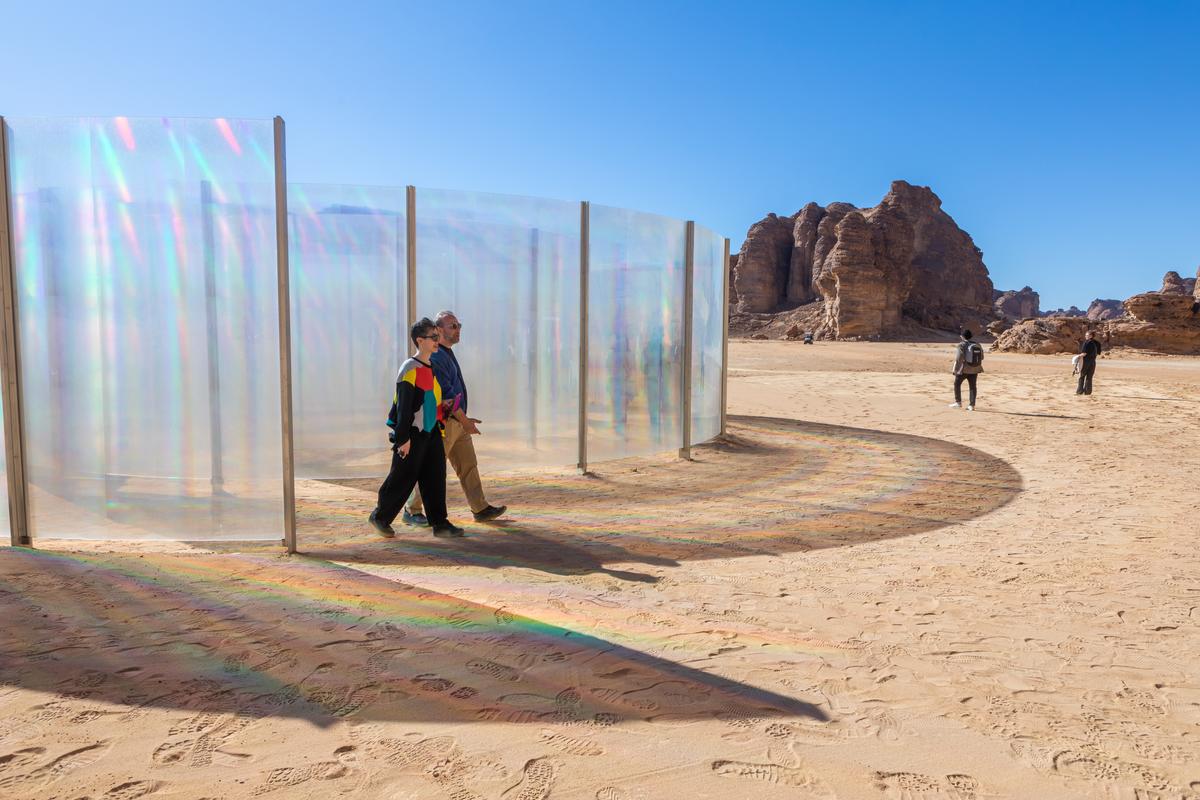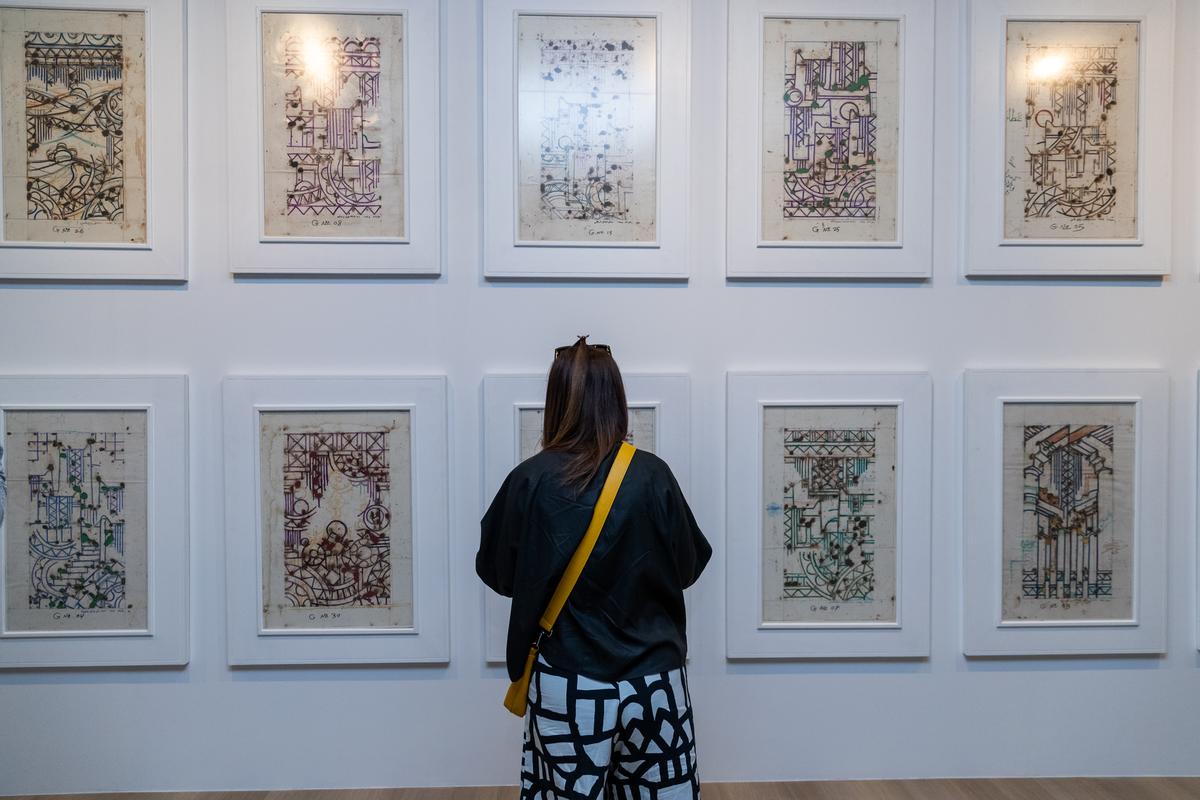
[ad_1]

Artist and curator Bose Krishnamachari and other guests tour More Than Meets the Eye exhibition at Maraya
Jazz and film festivals, fashion weeks, book fairs, art biennales and exhibitions, combined with ambitious plans to build multiple museums. Welcome to 21st century Saudi Arabia, where culture hopes to triumph over conservative religious ideology. Ever since Prince Mohammed bin Salman unveiled his Vision 2030 eight years ago, the kingdom is placing big bets on culture to attract tourism to boost the economy.
To further that vision, the country has already spent about $1.25 trillion on mega building projects, according to global real estate consultants Knight Frank, including such ambitious initiatives such as the Red Sea Project — where archaeological sites, islands and waters to rival the Maldives are meant to draw visitors. And it’s finding fans, including footballer Cristiano Ronaldo who moved there two years ago with his family and has been taking to social media recently to express his admiration for the land and its culture.
Other initiatives include the development of AlUla, a 2,000-year-old historic site on the ancient incense route, replete with caves and tombs, into a cultural destination. It has two major museums being developed: a contemporary art museum supported by the Centre Pompidou in Paris and the Museum of the Incense Road. They are among 15 cultural properties planned for the area.
This newfound cultural embrace is resulting in sundry conferences and events across Saudi. The inaugural Future Culture Summit, hosted earlier this year in AlUla, was one such event. Designed to explore the various ways in which culture can advance human thought, it seemed an apt topic given the political turmoil in the region.
The summit — which included speakers such as Laurent Le Bon, president of the Centre Pompidou, and Nora Razian of Dubai’s Jameel Arts Center — kicked off with the third edition of Desert X AlUla, an immersive open air art exhibition. The setting seemed an appropriate metaphor for the scale of what the kingdom is trying to achieve. Co-curated by Oxford-based Maya El Khalil and Brazilian documentary filmmaker Marcello Dantas, the exhibition, titled In the Presence of Absence, featured art works that explored trade, migration and time. “Deserts are full of life, they are full of history and full of different kinds of life forms… so how do we learn from that environment,” noted El Khalil.

Guests tour an art installation by Kimsooja, titled To Breathe, in AlUla
‘Culture opens doors to possibilities’
“There are not so many countries in the world where among the first possibilities for development is culture,” said Le Bon, while Jerome Sans, who co-founded Palais de Tokyo, a centre for contemporary creation, stated that it was fascinating that Saudi understood the importance of culture. “Culture opens doors to possibilities and that is what is happening here now. My colleagues from other institutions, artists, curators, thinkers are here because Saudi is one of the most interesting laboratories of the future — they are rethinking how they should adapt.”
One of the most fascinating performances at the summit was by professor Eduardo Miranda of the University of Plymouth in the U.K., on how quantum computers can help make music by mapping brain waves, which could eventually help people with special needs. Also, on the side lines was an art show displaying Saudi art over the past 25 years. Held at Maraya, the world’s largest mirrored building, the show reflected the diversity and complexity of a nation largely viewed as a monolith from the outside.

More Than Meets the Eye exhibition
“This is a region where a lot has been spoken about, but not much has been heard from,” said Abdullah Al Rashid, director of the King Abdulaziz Center for World Culture in Dhahran. “We’ve been running the Saudi film festival for 10 years [over 400 Saudi films are exhibited annually] and this year our guest programme will be from India, not just Bollywood but independent films too.” In fact, with so many western experts involved in building the kingdom’s future institutional cultural foundation, one wonders why a geographically proximate neighbour like India doesn’t have more of an involvement.
Youth are helping drive the change
With 63% of its 37 million population under age 30, Saudi youth are helping drive some of the change. Loulwa Al Sharif used to perform underground till 2018, when it became legal for women to sing in public. She is the kingdom’s first female singer to sing at public concerts, and said her own experience is living proof that a huge change is underfoot.
Of the first time she sang in public, she said: “I was nervous, my hair was uncovered, and the women in the audience were covered, but they were so supportive and they sang along. They came up to me afterwards to say how much they loved my performance. Finally, we have a platform and chance to be who we are.”
Published – September 06, 2024 05:13 pm IST
[ad_2]
Source link